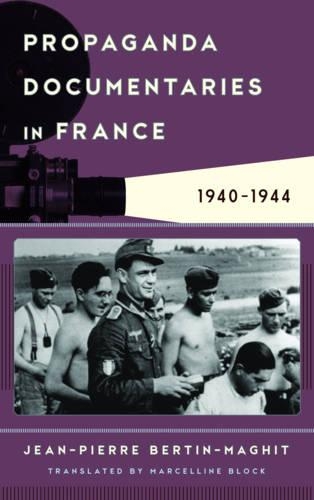
Propaganda Documentaries in France: 1940-1944
(Hardback)
Publishing Details
Propaganda Documentaries in France: 1940-1944
By (Author) Jean-Pierre Bertin-Maghit
Translated by Marcelline Block
Bloomsbury Publishing PLC
Rowman & Littlefield Publishers
9th November 2016
United States
Classifications
Professional and Scholarly
Non Fiction
European history
Political control and freedoms
940.5488744
Physical Properties
Hardback
288
Width 158mm, Height 238mm, Spine 27mm
581g
Description
In occupied France, the Nazis pursued aggressive, tightly orchestrated measures designed to monopolize the French market and foster agitation against Americans, Jews, Communists, and others. The documentary film was one instrument of propaganda employed by the Nazi occupiers, as well as the Vichy government and collaborationists. Nearly two hundred of those documentaries have been restored by the French Film Archives. Jean-Pierre Bertin-Maghits Propaganda Documentaries in France: 19401944 is the first volume specifically devoted to nonfiction propaganda films distributed in France during the dark years of the German Occupation. This book provides a concise overview of Vichy and German film policies, including the purchase of an extensive network of movie houses, many of which were expropriated from Jewish owners. In addition, popular prewar American and French feature films were banned, while theaters were flooded with propagandist titles. Bertin-Maghit also illustrates how ideological priorities and political negotiations played out in both topical documentaries and weekly newsreels, juxtaposing Vichys integrationist propaganda with German-sponsored documentaries of agitation and exclusion. While documentaries are the primary focus of this work, the author also addresses other forms of propaganda, such as newsreels and posters. Appearing in English for the first timeand featuring a filmography of 178 restored worksPropaganda Documentaries in France: 19401944 is a provocative and wide-ranging work of history and cinema that will be of interest to film scholars and historians as well as sociologists and political scientists.
Reviews
Bertin-Maghit provides a detailed analysis of the linkages between French and German propaganda during the Vichy years. Though the Nazis and the French collaborationist government had some common goalsfor example, the vilification of the British and virulent anti-Semitismthey also diverged on a number of points, in particular the future of France. To focus on these points of convergence and divergence, Bertin-Maghit scrutinizes the mechanisms and content of Vichy documentary filmmaking. Vichy propagandists considered the documentary format as the most effective for influencing public opinion, an attitude that was in line with Nazi propaganda. Indeed, Vichy propagandists often mined Nazi documentaries for actuality footage. Vichy propagandists, however, wanted their documentary films to promote Marshal Petain and encourage what they called a national regeneration rather than Nazi themes of European hegemony. Despite their outward assertions of independence, Vichy propagandists, and their films, were subordinate to German policy and ultimately a failure. [T]he book is a valuable resource for students of wartime propaganda. For research libraries. Summing Up: Recommended. Upper-division undergraduates and above. * CHOICE *
The appearance of this translation of Jean-Pierre Bertin-Maghits 2007 French-language work is a timely reminder of the importance of the role of documentary film during the Occupation and takes as its focus a specific grouping of documentaries in support of its argument. . . . This is. . . an important addition to works available in English providing greater understanding and interpretation of Occupied France and of the mechanisms deployed in the promotion of the palatability of the Vichy regime and its collaborators (in all senses of the word). * H-France Review *
Author Bio
Jean-Pierre Bertin-Maghit is professor of cinema studies at Universit Sorbonne NouvelleParis 3, where he is director of the Institut de recherche sur le cinma et laudiovisuel (IRCAV). Marcelline Block is a lecturer in history at Princeton University. She is the author of World Film Locations: Paris (2011), editor of Situating the Feminist Gaze and Spectatorship in Postwar Cinema (2010), and co-editor of French Cinema and the Great War: Remembrance and Representation (2016).
